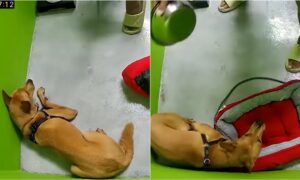“This post contains affiliate links, and I will be compensated if you make a purchase after clicking on my links.”
Here are some Tips on Dog Allergies that you may find informative. Like humans, dogs also suffer from different kinds of allergies caused by many factors. By nature, dogs like to scratch themselves and usually, this is only a normal reaction to things like dust or pests. But if your dog starts showing some more serious symptoms such as swollen parts of the skin, vomiting, excessive sneezing and scratching, diarrhea, and itchy eyes among others, then your dog might be allergic to something.
Tips on Dog Allergies
For dogs, there are three kinds of allergic reactions: inhalation, contact and ingestion.
Inhalation
This is the allergy produced when your dog inhales something like dust, pollens, dander, perfumes, and other allergens that can also be allergic to humans. The dogs that are allergic to these things can scratch heavily and repeatedly, and some even have skin inflammations and bite at some parts of their skin. Hot spots can occur to the dog if it scratches and bites too much. This is extremely discomforting for the dogs.
Consult your local vet for medications on the dog’s allergies. The most common treatments come in the form of vaccine or other medicine. Aside from that, pet owners are also advised to perform a general cleaning of their residence, especially the dog’s place, to get rid of all the possible allergens of your dog. Hypoallergenic bath products can also be helpful.
Contact
When your dog gets in contact with or touches a certain material or object, like plastic, rubber, fabrics, and many others, and gets skin-irritated and other allergic symptoms, then the dog might be allergic to that object. Redness of the skin can occur to your dog.
To get rid of the dog’s allergy, determine the source of the allergy and remove contact of it with your dog. To heal its skin, a cortisol-based bath can be used for your dog.
Determining the source can be a slow, painstaking process, because you will have to remove only a few items at most at a time from contact with the dog, and then observe over a few days to see if the dog improves.
Ingestion
Some dogs tend to have allergic reactions to certain foods that they eat. The most common allergens for ingestion are pork, chicken, beef, corn, and wheat that may be included in the dog food. Itching, scratching and coughing of the dog are the best known symptoms for that. They may also experience certain gastrointestinal problems like diarrhea, vomiting, and others. Eliminating certain foods on his diet one by one until you get the allergen can help resolve the allergy problem.
Anti-allergy foods are available in the market, and usually contain all natural foods which are high in protein. The common ingredients for these foods are fish products like fish oil and salmon, as well as broccoli.
Overall, dog allergies can occur differently for different dogs, and may have different symptoms and allergens. It is still best to consult your local vet and get advice in identifying what is causing your dog’s allergic reaction.
That is an important point — check with your vet. An excerpt from an excellent article on Mother Nature Network’s website states:
…“Not all over-the-counter medications are safe for use of pets,” Dunnings said, noting that many dog owners use Benadryl to help relieve some of the itching and scratching. The antihistamine “typically makes the pet kind of drowsy, reducing itching because they are sleepier,” she said. But it’s easy to miscalculate the appropriate dosage for Chihuahua versus a Great Dane.
“At least call the clinic prior to dispensing,”….
Another of the best Tips on Dog Allergies is the following: one of the most common factors in an allergy is an infestation of the dog’s living area. If your dog doesn’t get frequent enough baths, then he might regularly be exposed to dust, germs and even possible mites or other “bugs” which can eventually become allergens. And therefore, to help to prevent allergies both in humans and dogs, cleaning and disinfecting the living area, and more frequent baths are the usual general remedy.
If you have found these Tips on Dog Allergies useful, please feel free to share them with others below.


















